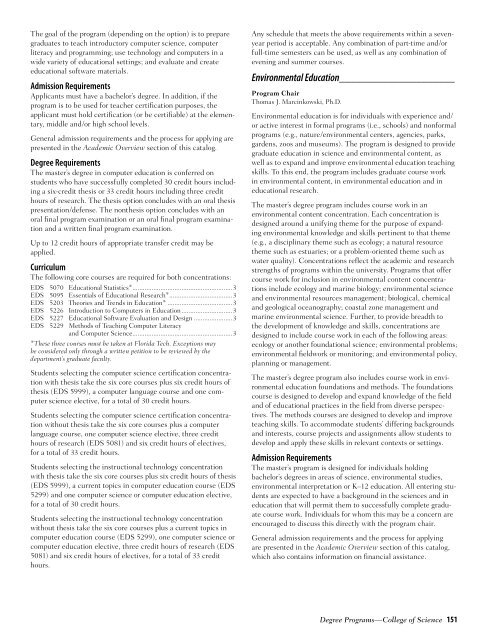2008–2009 - Florida Institute of Technology
2008–2009 - Florida Institute of Technology
2008–2009 - Florida Institute of Technology
Create successful ePaper yourself
Turn your PDF publications into a flip-book with our unique Google optimized e-Paper software.
The goal <strong>of</strong> the program (depending on the option) is to prepare<br />
graduates to teach introductory computer science, computer<br />
literacy and programming; use technology and computers in a<br />
wide variety <strong>of</strong> educational settings; and evaluate and create<br />
educational s<strong>of</strong>tware materials.<br />
Admission Requirements<br />
Applicants must have a bachelor’s degree. In addition, if the<br />
program is to be used for teacher certification purposes, the<br />
applicant must hold certification (or be certifiable) at the elementary,<br />
middle and/or high school levels.<br />
General admission requirements and the process for applying are<br />
presented in the Academic Overview section <strong>of</strong> this catalog.<br />
Degree Requirements<br />
The master’s degree in computer education is conferred on<br />
students who have successfully completed 30 credit hours including<br />
a six-credit thesis or 33 credit hours including three credit<br />
hours <strong>of</strong> research. The thesis option concludes with an oral thesis<br />
presentation/defense. The nonthesis option concludes with an<br />
oral final program examination or an oral final program examination<br />
and a written final program examination.<br />
Up to 12 credit hours <strong>of</strong> appropriate transfer credit may be<br />
applied.<br />
Curriculum<br />
The following core courses are required for both concentrations:<br />
EDS 5070 Educational Statistics* .........................................................3<br />
EDS 5095 Essentials <strong>of</strong> Educational Research* ....................................3<br />
EDS 5203 Theories and Trends in Education* .....................................3<br />
EDS 5226 Introduction to Computers in Education .............................3<br />
EDS 5227 Educational S<strong>of</strong>tware Evaluation and Design ......................3<br />
EDS 5229 Methods <strong>of</strong> Teaching Computer Literacy<br />
and Computer Science.........................................................3<br />
*These three courses must be taken at <strong>Florida</strong> Tech. Exceptions may<br />
be considered only through a written petition to be reviewed by the<br />
department’s graduate faculty.<br />
Students selecting the computer science certification concentration<br />
with thesis take the six core courses plus six credit hours <strong>of</strong><br />
thesis (EDS 5999), a computer language course and one computer<br />
science elective, for a total <strong>of</strong> 30 credit hours.<br />
Students selecting the computer science certification concentration<br />
without thesis take the six core courses plus a computer<br />
language course, one computer science elective, three credit<br />
hours <strong>of</strong> research (EDS 5081) and six credit hours <strong>of</strong> electives,<br />
for a total <strong>of</strong> 33 credit hours.<br />
Students selecting the instructional technology concentration<br />
with thesis take the six core courses plus six credit hours <strong>of</strong> thesis<br />
(EDS 5999), a current topics in computer education course (EDS<br />
5299) and one computer science or computer education elective,<br />
for a total <strong>of</strong> 30 credit hours.<br />
Students selecting the instructional technology concentration<br />
without thesis take the six core courses plus a current topics in<br />
computer education course (EDS 5299), one computer science or<br />
computer education elective, three credit hours <strong>of</strong> research (EDS<br />
5081) and six credit hours <strong>of</strong> electives, for a total <strong>of</strong> 33 credit<br />
hours.<br />
Any schedule that meets the above requirements within a sevenyear<br />
period is acceptable. Any combination <strong>of</strong> part-time and/or<br />
full-time semesters can be used, as well as any combination <strong>of</strong><br />
evening and summer courses.<br />
Environmental Education _____________________<br />
Program Chair<br />
Thomas J. Marcinkowski, Ph.D.<br />
Environmental education is for individuals with experience and/<br />
or active interest in formal programs (i.e., schools) and nonformal<br />
programs (e.g., nature/environmental centers, agencies, parks,<br />
gardens, zoos and museums). The program is designed to provide<br />
graduate education in science and environmental content, as<br />
well as to expand and improve environmental education teaching<br />
skills. To this end, the program includes graduate course work<br />
in environmental content, in environmental education and in<br />
educational research.<br />
The master’s degree program includes course work in an<br />
environmental content concentration. Each concentration is<br />
designed around a unifying theme for the purpose <strong>of</strong> expanding<br />
environmental knowledge and skills pertinent to that theme<br />
(e.g., a disciplinary theme such as ecology; a natural resource<br />
theme such as estuaries; or a problem-oriented theme such as<br />
water quality). Concentrations reflect the academic and research<br />
strengths <strong>of</strong> programs within the university. Programs that <strong>of</strong>fer<br />
course work for inclusion in environmental content concentrations<br />
include ecology and marine biology; environmental science<br />
and environmental resources management; biological, chemical<br />
and geological oceanography; coastal zone management and<br />
marine environmental science. Further, to provide breadth to<br />
the development <strong>of</strong> knowledge and skills, concentrations are<br />
designed to include course work in each <strong>of</strong> the following areas:<br />
ecology or another foundational science; environmental problems;<br />
environmental fieldwork or monitoring; and environmental policy,<br />
planning or management.<br />
The master’s degree program also includes course work in environmental<br />
education foundations and methods. The foundations<br />
course is designed to develop and expand knowledge <strong>of</strong> the field<br />
and <strong>of</strong> educational practices in the field from diverse perspectives.<br />
The methods courses are designed to develop and improve<br />
teaching skills. To accommodate students’ differing backgrounds<br />
and interests, course projects and assignments allow students to<br />
develop and apply these skills in relevant contexts or settings.<br />
Admission Requirements<br />
The master’s program is designed for individuals holding<br />
bachelor’s degrees in areas <strong>of</strong> science, environmental studies,<br />
environmental interpretation or K–12 education. All entering students<br />
are expected to have a background in the sciences and in<br />
education that will permit them to successfully complete graduate<br />
course work. Individuals for whom this may be a concern are<br />
encouraged to discuss this directly with the program chair.<br />
General admission requirements and the process for applying<br />
are presented in the Academic Overview section <strong>of</strong> this catalog,<br />
which also contains information on financial assistance.<br />
Degree Programs—College <strong>of</strong> Science 151

















